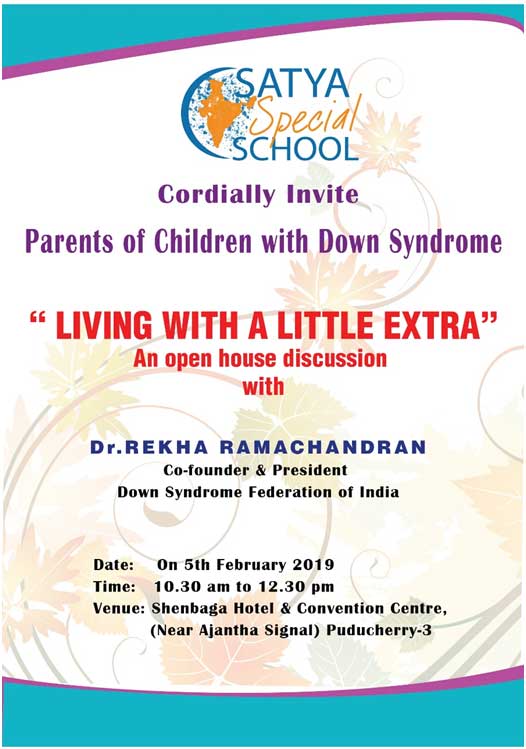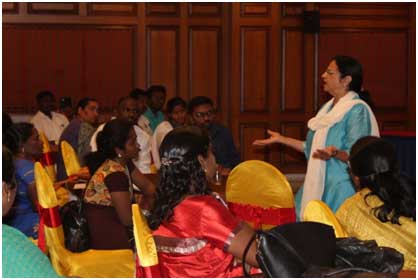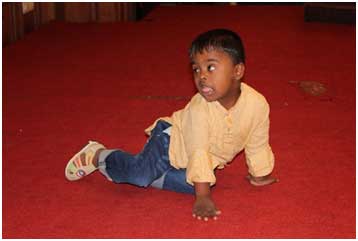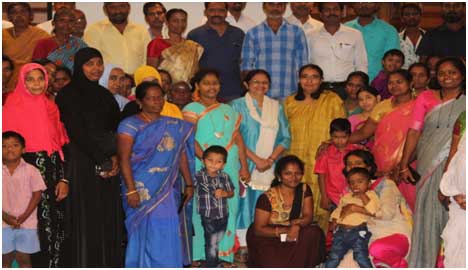A learning experience at Pondicherry
Dr. Surekha Ramachandran, President – Down Syndrome Federation of India was in Pondicherry on a holiday, but she still managed to meet up with some teachers and parnets who were associated with a special school – Satya Special School.
It was a session that was both interactive and fun. Dr. Ramachandran with her vibrant energy and the audience with their thirst to learn more made a fantastic combination. They were willing to understand more about taking care of persons with Down syndrome and their needs. To groom them and make them an integral part of society is the goal and how to fulfil it was what was discussed. Parents were keen to provide their children with a better future and the discussion was very fruitful for both parties.
It is necessary for parents to understand the needs of their children and teach them appropriately. That will help children gain confidence and help them in the goal of inclusion in society.This was a great learning experience for the attendees.
LIVING WITH A LITTLE EXTRA
An Open House with Dr. Reka Ramachandran
- Date:05.02.2019
- Title:“Living with a Little Extra”
- Location of Event: Shenbaga Hotel and Convention centre,Pondicherry
- Resource Person:Dr. Rekha Ramachandran
- Time: 9.00 am to 12.30 pm
- No. of Participants: 76 (NGOs and Institution – 37 and Parents of CWDS– 39)
ABSTRACT
"There is no better Therapist than a Parent"
Satya Special School hosted an open house discussion for Parents of Children with Down’s Syndrome with Dr. Rekha Ramachandran Co- Founder & President, Down Syndrome Federation of India on 05th February. The purpose of this open house group was to focus on the effect of having a child with Down syndrome on the parents, the difficulties encountered by the families, parenting techniques & the importance of various therapies on the growth of the child.
DISCUSSION
The Discussion started with Dr. Reka highlighting the importance of
early childhood intervention services in meeting the developmental needs of the child the various strategies to assist their development. She also spoke about the appropriate therapies that will help improve communication, social skills, independence and mobility. She added that it is important for families to support the therapist in the intervention process. Depending on the child individual needs therapists, Special Educators & parents have to work together to ensure the child gets its needs fulfill she stressed.Reacting to questions on improving communication skills, Dr Rekha stressed on the need for quality family time and the role the Mother could play in scheduling the child’s daily routine. Tips on adding an element of fun in activities of daily living, using simple songs and gestuers to encourage and motivate the child, toilet training and how this could be done in partnership both in the school as well as at home and most improtantly the negative influence of watching television and how tyechnology is often used to replace human interaction were the highlights of her talk.
While addressing therapist present, she stressed on the importanance of working as a team where the needs of the child are communicated both among the therapist and also parents. She aasured all the necessary technical training and support for ensuring that the therapist upgrade the skills in handling children with Down syndrome.
While discussing the needs of adults with Down Syndrome Dr. Reka shared a few experiments of groups of adults living in communities,she stressed on the importance of role of the parent in ensuring that the adults build peer relationships with their counter parts. She wanted at least one such initiatives of a group of adults living under the care and guidance of a parent to be started at Pondicherry in the near future.
She requested parents and Special Educators to approach the various local schools to ensure inclusion of Children with Down syndrome into main stream classrooms. She also highlighted the importance of teaching adolescent girls about menstrual health and hygiene and stress the need to make the child aware about safe & unsafe touch from a very young age.
- In continuation to this open house discussion the following was the plan of action agreed upon for Pondicherry.
- Interaction with Paediatric association on early identification
- Training program for therapist and special educators on handling children with down syndrome
- Forming a WhatsApp group with parents to ensure exchange of ideas/situations and suggestions.
CONCLUSION:
In conclusion, individuals with Down syndrome have a huge impact on the functioning of the family unit. Both parents and typically developing siblings experience challenges and rewards associated with living with a child with Down syndrome. Between the Down syndrome behavioral phenotype, the cognitive and language delays, and the large amount of attention individuals with Down syndrome require from caregivers, the effects of Down syndrome are far reaching. With small changes over time, families are likely able to adapt to living with and caring for the individual with Down syndrome.









